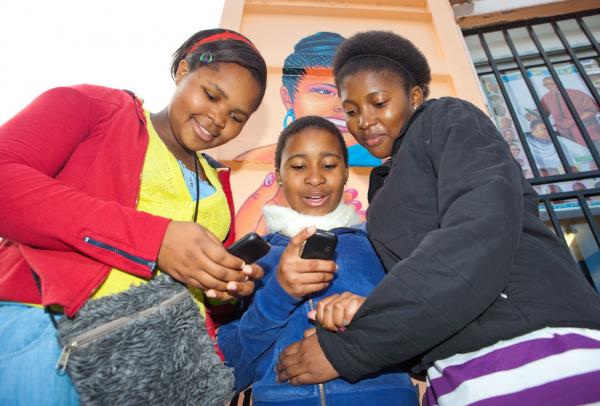Reading for change: organisation addresses social issues through cellphone fiction

FunDza Literacy Trust is an NGO that aims to popularize reading amongst young South Africans. FunDza’s goals are to encourage youngsters to read for pleasure and to help students, particularly those from disadvantaged backgrounds, to become effectively literate.
“We also believe fiction has the power to affect social change, as reading stories develops empathy and imagination,” says Dorothy Dyer, FunDza’s co-founder and literacy specialist.
Dyer was a teacher at LEAP school of science and mathematics for talented students from disadvantaged communities. She realised that children would be more interested in reading if there was fiction available that related to their lives and was relevant to their experiences.
To commission and publish stories of this kind, Dyer and three other partners founded Cover2Cover Books, a small publishing company. They realized they needed to get the books and other reading material into the hands of young South Africans. To this end Cover2Cover founded FunDza Literacy Trust, a not-for-profit organisation dedicated to improve the literacy levels of teens and young adults.
FunDza distributes its books nationwide to more than 160 beneficiaries - schools and literacy organisations.
“The books are very popular. Some schools report that students are forming reading groups to discuss the stories,” says Dyer.
To get new and local stories to reach more youngsters, FunDza has developed an internet site that is accessible from computers, tablets or cellphones, and also feeds content through a Mxit portal with 350 000 Mxit contacts and a daily readership of between 6000 and 12 000. A new story is released every week. A chapter each day is 600 to 1000 words long. Readers can access and read the books on their phones for free.
FunDza saw the possibility of using their stories to address specific social issues. On 20 June, FunDza wrote and published a short story, Finders Keepers, on their networks, Mxit and online, to coincide with World Refugee Day.
“We wanted the story to get readers to understand the difficulties of what it is like to be a refugee, and also to show that refugees are people like everyone, with their fears, dreams and hopes,” says Dyer.
The story was authored by Ros Haden and Pheobe Sibomana - a FunDza employee and a Rwandan refugee. It is a love story between a Rwandan girl and a South African boy.
Sibomana says, “It was a good experience … I was able to share some of what I have been through as well as some of what my friends and family have been through as refugees.”
Finders Keepers was published, advertised, and released in English and isiZulu a chapter per day between 14 and 20 June. It was widely read, and some readers found they had to confront their stereotypes and assumptions about refugees.
One Mobi network reader commented (in typical Mxit text): ‘i do olso have the thot thtreffugesdnt belong here buh this story kinda made mi c thingzdifferently? keep up the good work im loving this storie;)’.
Another comment read: ‘imenjyin dis st0ry its insightful, we r s0 quick 2 judge wen we dnt even knw 0tha ppls situati0ns’.
So far there have been over 1000 comments on the story, which FunDza believes shows a significant level of engagement.
“FunDza is careful not to produce writing that is preachy”, says Dyer. “The message must be driven by the stories’ characters and their experiences. We place high priority on the quality of the writing. The stories must be well written, interesting and enjoyable, and written in accessible English.”
By providing material that young South Africans want to read, and indirectly addressing issues that exist in the lives of young readers, the FunDza literacy trust makes a valuable contribution bolstering social awareness and literacy in South Africa.
Support independent journalism
Donate using Payfast


This article is licensed under a Creative Commons Attribution-NoDerivatives 4.0 International License.
